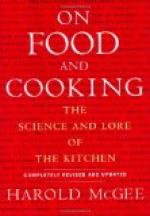It is especially important that a dietary for children should contain an abundance of nitrogenous material. It is needed not only for repairs, but must be on deposit for the purpose of food. Milk, whole-wheat bread, oatmeal, barley, and preparations of wheat, contain this element in abundance, and should for this reason be given great prominence in the children’s dietary.
Flesh foods are in no way necessary for children, since the food elements of which they are composed can be supplied from other and better sources, and many prominent medical authorities unite in the opinion that such foods are decidedly deleterious, and should not be used at all by children under eight or ten years of age. Experiments made by Dr. Camman, of New York, upon the dietary of nearly two hundred young children in an orphan’s home, offer conclusive evidence that the death rate among children from gastro-intestinal troubles is greatly lessened by the exclusion of meat from their dietary. Dr. Clouston, of Edinburgh, an eminent medical authority, states that in his experience, those children who show the greatest tendencies to instability of the brain, insanity, and immoral habits are, as a rule, those who use animal food in excess; and that he has seen a change of diet to milk and farinaceous food produce a marked change in their nervous irritability.
Scores of other authorities corroborate. Dr. Clouston’s observation, and assert that children fed largely on flesh foods have capricious appetites, suffer more commonly from indigestion in its various forms, possess an unstable nervous system, and have less resisting power in general.
Candy and similar sweets generally given to children as a matter of course, may be excluded from their dietary with positive benefit in every way. It is true, as is often stated in favor of the use of these articles, that sugar is a food element needed by children; but the amount required for the purpose of growth and repair is comparatively small, and is supplied in great abundance in bread, grains, fruits, and other common articles of food. If an additional quantity is taken, it is not utilized by the system, and serves only to derange digestion, impair appetite, and indirectly undermine the health.




